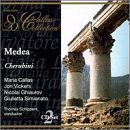| All Artists: Luigi Cherubini, Thomas Schippers, Alfredo Giacomotti, Edith Martelli, Giulietta Simionato, Ivana Tosini, Jon Vickers, Limbania Leoni, Maria Callas, Nicolai Ghiaurov Title: Cherubini: Medea Members Wishing: 0 Total Copies: 0 Label: Opera D'oro Original Release Date: 1/1/1961 Re-Release Date: 6/20/2000 Genre: Classical Styles: Opera & Classical Vocal, Historical Periods, Classical (c.1770-1830), Modern, 20th, & 21st Century Number of Discs: 2 SwapaCD Credits: 2 UPC: 723723828125 |
Search - Luigi Cherubini, Thomas Schippers, Alfredo Giacomotti :: Cherubini: Medea
 | Luigi Cherubini, Thomas Schippers, Alfredo Giacomotti Cherubini: Medea Genre: Classical
|
Larger Image |
CD Details |
CD ReviewsEVEN AT THE END -- CALLAS' MEDEA STILL A FIRE EATING DRAGON! L. Mitnick | Chicago, Illinois United States | 07/29/2001 (5 out of 5 stars) "This 1961 performance is a great surprise to me. By 1961 Maria Callas' vocal problems (as well as her relationship with Aristotle Onasis) were fodder for gossip columns all over the world. Her operatic appearances were becoming rarer and rarer and every Callas performance by then had an almost circus-like atmosphere about it. This "Medea" finds Callas in her last La Scala season, and though the later performances of this Medea series in May of 1962 found her in very serious vocal difficulty, the premiere performance recorded here finds her very much at the top of her form. Well, admittedly, the climatic top notes do tend to waver, but never alarmingly so. But the voice as a whole is rock solid, powerful ----- and the fabled chest tones are as menacing as ever. Whether venemous, tormented or triumphant, Callas rises to every dramatic challenge masterfully. After listening to any Callas Medea performance, one does not have to wonder why the opera is not performed today ---- who could even hope to attempt such an Amazonian role? The supporting cast heard here at La Scala may constitute the greatest ever encountered in any Callas Medea performance.As Neris, the faithful maid, the great Italian mezzo soprano Gulietta Simionato makes the most of her role, most notably her beautiful aria in Act II (though it must be said that as good as she is, she is no better than Teresa Berganza and Fedora Barbieri ---- who partnered Callas in previous Medea performances). Jon Vickers IS the greatest Jason of any Callas Medea. Vickers was probably the only tenor capable of meeting Callas on her own musical and dramatic plane --- and he is heard here at the very beginning of his international career. The same might also be said about Nicolai Ghiaurov, who was also at the dawn of what was to be one of the most important careers in opera. Thomas Schippers may not pace this opera with the sheer animal intensity of Leonard Bernstein (at La Scala in 1953) or Nicola Rescigno (in Dallas in 1958), but he generates an excitement that is substantial enough. The sound of this recording is, to my ears, superior to both the 1953 La Scala and 1958 Dallas live recordings. The price is incredibly cheap ----- and Callas proves that, even in 1961, she still had the capacity to wrench more out of this opera than anyone else. A real bargain!" Callas' Last Medea Calvin M Goodwin | 08/13/2000 (4 out of 5 stars) "Although some Opera D'Oro releases suffer from over-filtering/noise-reduction techniques, this is not one of them. The sound is clear and undoctored. Moreover the speed seems to be accurate. One had always read that in this, her final series of Medeas (and her last appearances at La Scala), Callas was in sadly diminished vocal form. Not so. True, the highest notes flap about alarmingly, but the middle register is rock-solid and the chest tones are full and without the dessicated quality of her later years. And the remaining cast members are superb!" Vickers/Callas the master voices Antonio Godinho | Porto, Portugal | 06/13/2000 (5 out of 5 stars) "The Best Cherubini and the best voices. Vickers and his vocal power and elegance and Callas here like always-the Diva."
|

 Track Listings (13) - Disc #1
Track Listings (13) - Disc #1